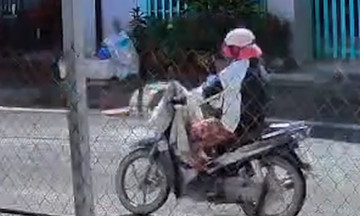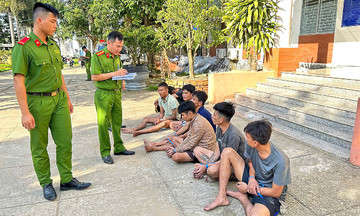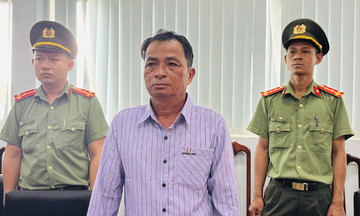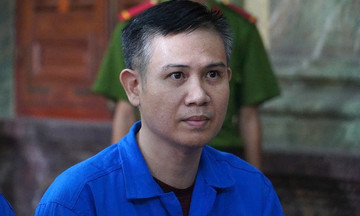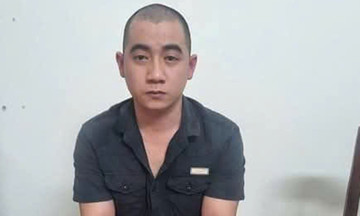On 16/9, the Phu Tho Provincial People's Court held an appellate hearing in a case of abuse of power, following an appeal by Nguyen Duy Thanh, 64, the head of Ben Dinh village in the former Lac Thuy district, Hoa Binh province, from 2015-2025, and Huynh Huu Phuc, 56, the village treasurer.
The first-instance verdict determined that Song Boi Thang Long Company was leased land by Hoa Binh province for agricultural production in Lac Thuy, adjacent to Ben Dinh village's old cemetery. Mr. Thanh subsequently petitioned the company for this land to expand the village cemetery.
Over 3,600 m2 of this land had been contracted to Mr. Kien, a farm worker, since 2021. Therefore, to allocate the land to the village, the company first had to terminate Mr. Kien's contract.
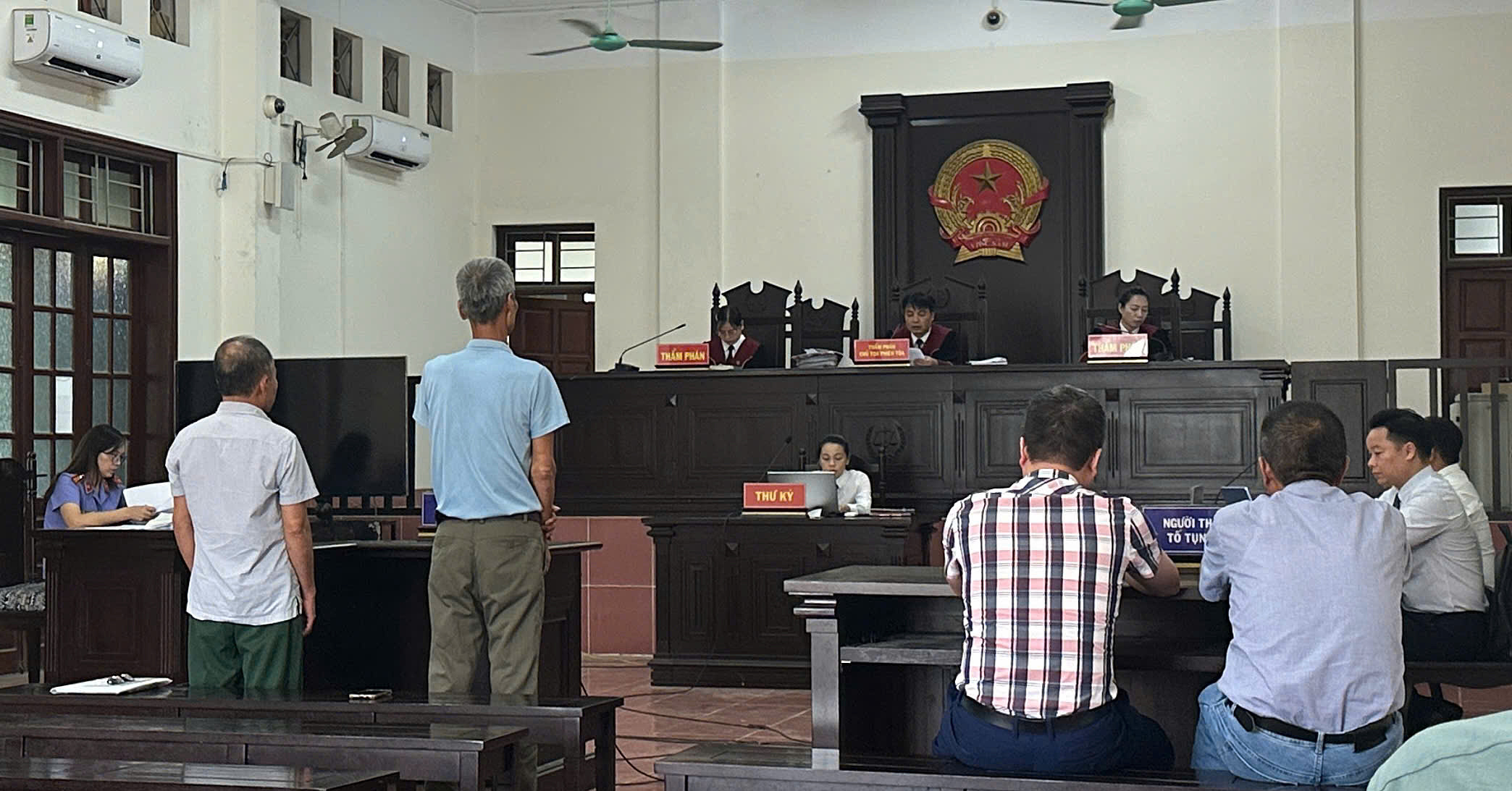 |
The two defendants (standing) at the court hearing on 16/9. Photo: Danh Lam |
However, before the contract's termination, Mr. Kien independently sold 1,000 m2 to villagers for burial plots for 49 million VND. Mr. Kien requested an additional 41 million VND and 100 m2 of burial land before transferring the remaining land to the village.
In October 2021, village head Thanh held a meeting with 106 households to discuss the situation.
To secure the funds for Mr. Kien, Mr. Thanh proposed a community fundraising effort: families needing burial plots could register and pay the village treasurer, Mr. Phuc.
Based on Mr. Kien's previous sale price, Mr. Thanh estimated a price of 141,000 VND/m2. The villagers agreed, and 12 households registered. In January 2022, the company terminated Mr. Kien's contract, and the 3,600 m2 plot was given to the village.
Mr. Thanh then allocated over 1,800 m2 to the purchasing households, resulting in an alleged 108 million VND loss to the state.
The total 281 million VND collected was used for village activities and cultural center equipment, totaling 138 million VND. The remaining 143 million VND was submitted to investigators.
The first-instance court deemed the case a simple complicity, with no personal motive or gain for the accused. While Mr. Thanh didn't personally profit, he allocated more land than needed to generate funds. This violated land allocation authority, causing "very serious" consequences requiring a 5-year prison sentence. Mr. Phuc received a 30-month suspended sentence.
Mr. Kien's family was found to have violated their contract by selling state-owned land while it was under contract. Authorities determined there wasn't sufficient evidence for criminal charges against Mr. Kien.
Song Boi Thang Long Company only leased the land and didn't have management authority. Their transfer to the village without provincial reclamation violated land use regulations but wasn't deemed criminal.
Both defendants appealed the verdict.
At the appeal hearing, Mr. Phuc claimed ignorance of the abuse of power charge, stating he had "no authority," simply followed the village head's instructions, and managed funds as directed.
Mr. Thanh, with limited education, explained the village's 138 households lacked a cemetery, prompting his efforts to secure land for burials. He emphasized the community meeting's agreement on the land price.
"When Mr. Kien asked for 90 million VND, the village fund was empty," the former village head stated. He explained the land allocation and fundraising aimed to pay Mr. Kien and support essential village activities. He acted solely for the villagers' benefit, without personal gain.
Regarding the 108 million VND loss attributed to the 1,800 m2, he argued it was unjustified, as the land remained unchanged and undeveloped. He pleaded for disciplinary action instead of a 5-year prison sentence.
The People's Procuracy upheld the initial charges and requested the appellate court reject the appeal and maintain the original verdict.
Lawyer: One without authority cannot abuse it
Defending Mr. Thanh, the lawyer argued the company's illegal land transfer negated his client's authority over the land, precluding abuse of power. The company's illegal transfer and Mr. Kien's sale of state-owned land should be addressed first.
"Can someone without authority abuse it?", lawyer Giang Hong Thanh questioned. He defined abuse of power as exceeding one's authority, acting beyond assigned responsibilities. He provided examples like a traffic officer issuing excessive fines or an investigator ordering detention without prosecutorial approval.
Citing the initial verdict referencing Article 59 of the 2013 Land Law, lawyer Thanh highlighted that only provincial and district People's Committees hold land allocation authority, not village heads. "Without authority, there can be no exceeding of authority," he argued.
He outlined the five elements of the crime: holding a position of authority, exceeding that authority, acting against official duties, motivated by personal gain, and causing consequences. Lacking the first element, his client was innocent.
Even if considered abuse of power, he argued it wasn't during official duties. He cited the Law on Cadres and Public Servants, defining official duties as "activities performed by cadres and public servants pursuant to their assigned authority and the law for state management and public needs."
He referenced Decree 34/2019, defining village heads as non-professional community leaders, not cadres or public servants. The commune confirmed Mr. Thanh's 10-year tenure with a monthly allowance of 1.1-1.8 million VND.
Therefore, Mr. Thanh, not being a cadre, public servant, or salaried employee, lacked official duties, authority, and thus couldn't abuse power.
The People's Procuracy countered that Mr. Thanh held authority as the approved head of Ben Dinh village. He should have reported the land allocation to the relevant authorities, which he didn't, nor did Phu Nghia Commune People's Committee instruct him on the matter.
As village head, he convened the meeting to agree on land allocation and collection from those needing burial plots.
The prosecutor cited Clause 7, Article 3 of Resolution 03/2020 of the Supreme People's Court's Council of Judges, defining "benefit" as exploiting one's position for unjust material or immaterial gain for oneself or others.
The unauthorized land allocation and collection for village expenses constituted "collective benefit."
The court will reconvene tomorrow.
Thanh Lam






